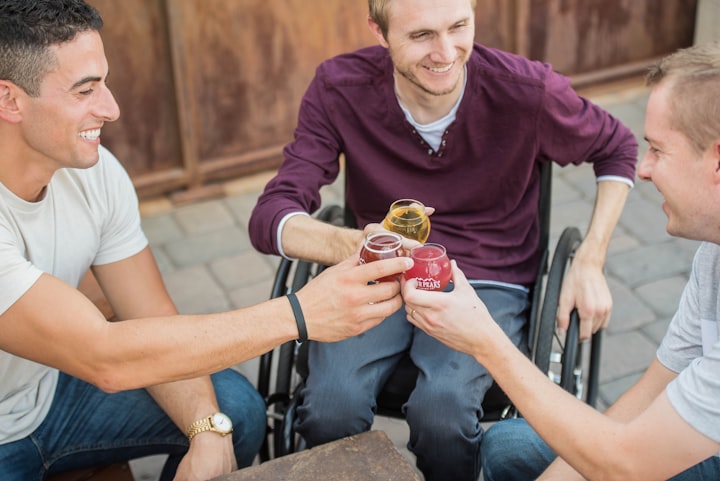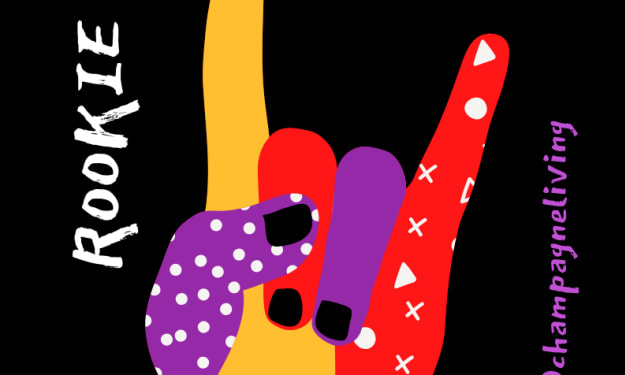"Bang, bang, bang", what is that noise I was hearing? It sounded as if someone was banging on the floors in the front of the house. My first thought was my teenaged son, G, was roughhousing with a buddy of his in the living room. I texted him and got no response. A few more minutes went by and I heard it again, so this time I walked around and found G laying on the living room floor. His grandfather was sitting in a chair reading a book and his buddy was sitting on the floor close by playing video games.
G had a look of terror on his face. I asked him what was wrong and he didn't answer. I knelt beside him and his buddy said he had fallen and claimed he couldn't move his arm and leg. His grandfather, Elmer, confirmed this. I looked by at G and said, "Son, can you squeeze my hand?" He could not and my fears began to materialize. I was the first to see my mother after she had fallen due to a stroke and now I feared my 16-year-old son was suffering from the same thing.
I yelled for his Mom to come to the living room and bring an aspirin while I telephoned the paramedics. We retrieved a pillow for G to keep him comfortable and his Mom, who is a nurse, began a more thorough assessment. By the time the ambulance arrived, we were certain G had suffered a stroke. He could not move his left arm and leg. He still had the ability to speak but he was confused and terrified. He was afraid he was going to die.

The paramedics arrived and soon afterward, G and his Mom headed to the hospital in the ambulance. I followed behind and by the time I parked and made it through security, the doctors were already working on G. Several tests were conducted and the decision was made to take him to the Dallas Children's Hospital where they were better capable of treating him for an ischemic stroke. Dallas is roughly 3 hours from our location. By now, some 9 hours had elapsed since G had collapsed at home and we were genuinely concerned for his long-term prognosis.
The trip to Dallas was uneventful which is a good thing given the circumstances. Upon our arrival, several doctors who I later learned were the juvenile stroke team met us at the ER parking lot and began their assessments immediately. Almost immediately, they began testing on G and set about determining why G had suffered a stroke, how extensive the damage was and what sort of rehabilitation would be required to return him to some sense of normalcy. I could tell this team was well-rehearsed and experienced and we felt at ease knowing the G was receiving the best care available to us.
Less than 24 hours after our arrival, the chief neurologist and stroke surgeon met with us in G's room to discuss their findings and a course of treatment. Unknown reasons caused the stroke but fortunately, the damage was minimal. There would be no immediate need for surgical intervention and rehabilitation would begin immediately. G had suffered an ischemic brain stroke which means G had a small blood clot appear in the left side of his brain.

Treatment began immediately and included an aggressive course of blood thinner therapy followed by a little over 2 months of in-patient physical therapy. By the time, G was released, he was talking and walking with some assistance. It took over a year of physical and speech therapy to return him to about 90% of his normalcy. Thank goodness for the skilled and professional medical staff that have dedicated their lives to understanding and curing those kids who face serious, life-changing illnesses such as what G faced.
During the course of his treatment, we learned that over 17k young men nationwide are afflicted with this same sort of stroke. It comes on suddenly and leaves just as suddenly. There are pediatric stroke teams all over the country trying to solve the mysteries behind why these occur and so far, they've not nailed any particular reason why, but they've excluded dozens of reasons that aren't the cause. It is only a matter of time before they isolate why it happens.
We were blessed to have the ability to have at least one of us with G with him at all times. He was never alone during his entire adventure. I noticed there were other kids that aren't as fortunate. The reasons are varied but tend to fall into the categories of single-parent households or both parents having to work during the workday. I mention this because I see this as a prime opportunity for anyone interested in exploring ways to give back to their communities.

Volunteering to sit and read a book or play a board game or even a video game with these kids will brighten their days and all it takes is an hour or two of your time. If this is something you may be interested in, contact your local children's hospital for details. I think you'll be surprised at how you can contribute. We are coming up on the 2nd anniversary of G's stroke and he plans to volunteer when he turns 18.
Volunteering isn't the entire gist of my story here. G is the baby of our family. He's always been athletic and had aspirations of attending college and becoming either a military officer or possibly a federal law enforcement officer. Those goals have changed since his stroke. I will admit that we have dealt with and continue to deal with bouts of depression with G. This is a natural occurrence for anyone but I believe it's amplified when you're entire life is turned upside down at the age of 16.

We are still cautious about his physical activity and letting him out of our sight for too long of a period. This stems from the fear that he may have another stroke. We take his health very seriously and I fear our caution has caused G to worry more than he should. So now, we are making adjustments. I want him to have a productive and happy life and I want him to be able to do the things he wants to do in life. Speaking of following his dreams, one of the side effects of his stroke was the effect it had on his brain. We were told that a part of his brain had ceased to function and that it would take time for his brain to reroute how it processed information around those parts that no longer functioned.
One of the immediate things we noticed was G had lost a lot of memory. It was simply gone. For example, he could no longer recognize the shape of certain letters and most numbers. He had no idea what they were. He had forgotten entire words and phrases. He had forgotten certain foods. He also forgot people and places. The doctors told us it was like having a computer hard drive that had been wiped clean. They assured us the hard drive was okay but that it needed to be repopulated with new data.

We began the arduous task of teaching G those things he had learned earlier in life beginning with his ABCs and numbers. We showed him photos of family and friends and of the trips we had taken. Before long, he began to recognize them again. But something else, surprising, happened too. G accelerated through his math studies very rapidly and within a few months was performing at an advanced collegiate level of math. He had also picked up a knack for learning foreign languages. As a child, he had been taught Latin. He quickly learned Spanish and is now teaching himself French too.
Back to following his dreams. G still wants to serve. He knows his health will most likely prevent him from ever joining the military or becoming a special agent. The physical demands are too great. However, he's recognized that he can still work in law enforcement as a translator or something along those lines. What is important is G has found purpose again.

Without purpose, life ceases to exist. The medical profession refers to it as a failure to thrive. I call it the reason you get out of bed in the morning. Everyone needs that reason. If you doubt me, take a look around your community. You'll see them every day. They have a look of hopelessness in their eyes. They can be found in all walks of life, but are mostly found among new retirees. People who have worked hard all of their life suddenly wake up one morning with nothing to do, nothing to contribute. It is important to help these people find a new purpose in life.
I saw that during G's recovery. Only it was magnified. He had no life experiences to pull from. He only had dreams and they all had been taken away from him. For a long time, he was faced with his mortality. That's a horrible thing for a 16-year-old to experience. If there is a silver lining to this experience, it has made G more appreciative of life and of living. We enjoy our time with him, we always have, but we now have deeper, more thoughtful conversations. This entire episode has matured him beyond his 18 years.
G recently said to me, "Dad, it really doesn't matter how many years you live as long you live each day to its fullest and with purpose." There's not much I can add to that.
About the Creator
Joey Lowe
Just an old disabled dude living in Northeast Texas. In my youth, I wanted to change the world. Now I just write about things. More about me is available at www.loweco.com including what I'm currently writing about or you can tweet me.







Comments
There are no comments for this story
Be the first to respond and start the conversation.